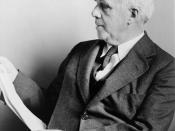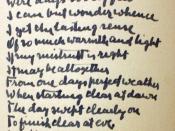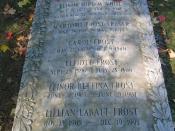Innocence is a quality of wholesomeness and importance that is cherished in a world enveloped with the temptation of man and natural crime. Robert Frost's poem "Nothing Gold Can Stay" expresses his views on innocence and how it is impossible to prolong its hasty existence. Frost implements elements of natural life in a number of his poems, including this one, as homage and respect to nature's ability to impersonate human life. He discusses the rarity of finding purity, especially in someone who has left their youth behind. Frost explains that once lost, the naiveté and innocence of one's early life is impossible to regain.
The poem's opening line immediately addresses the theme of the poem, with a colorful, yet concise, vision of nature. The first three words, "Nature's first green", hints to the arrival of spring, a time of rebirth, signifying the engendering of the natural world. Frost uses this setting to direct the reader's thoughts to a place of wholesome, natural life.
His inclusion of the word "gold" in this line further signifies the innocence of nature, and how highly this object is cherished. Discovering pure innocence becomes more difficult as time progress and has grown to be a rare entity in society. Frost claims that, if present, innocence will surely not last, letting the gold swiftly lose its worth. He implies that the world has so much temptation that makes innocence the "hardest hue to hold", making it unfeasible to attain this significant quality for long.
Frost also emphasizes that youth is the greatest period in life and that the "gold" in our lives will not last. He continues the poem by implementing the metaphor of a flower and how its beauty is at its peak when young and naive. What Frost seems to wish for...



"Nothing Gold Can Last"
Good job! Nice analysis, very thought provoking.
1 out of 1 people found this comment useful.